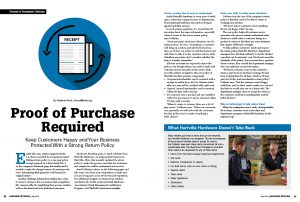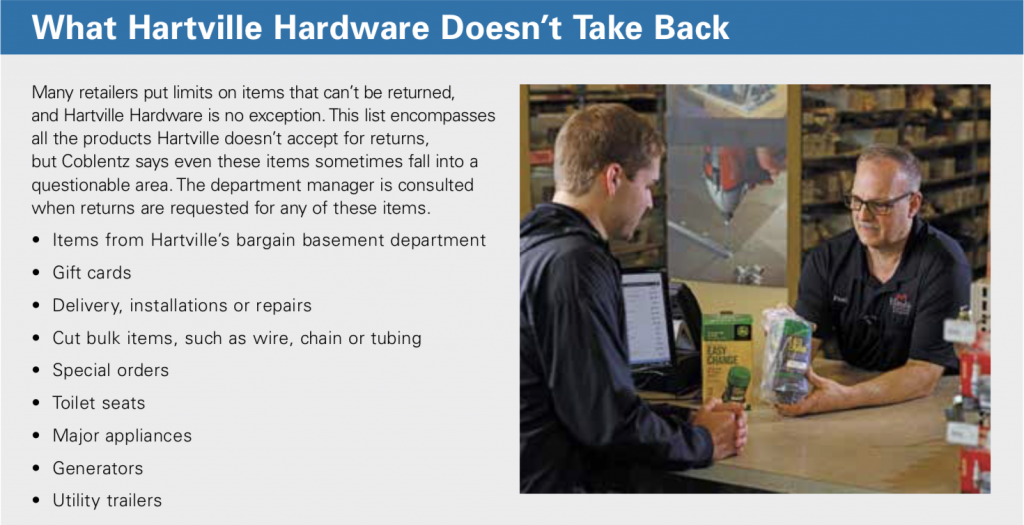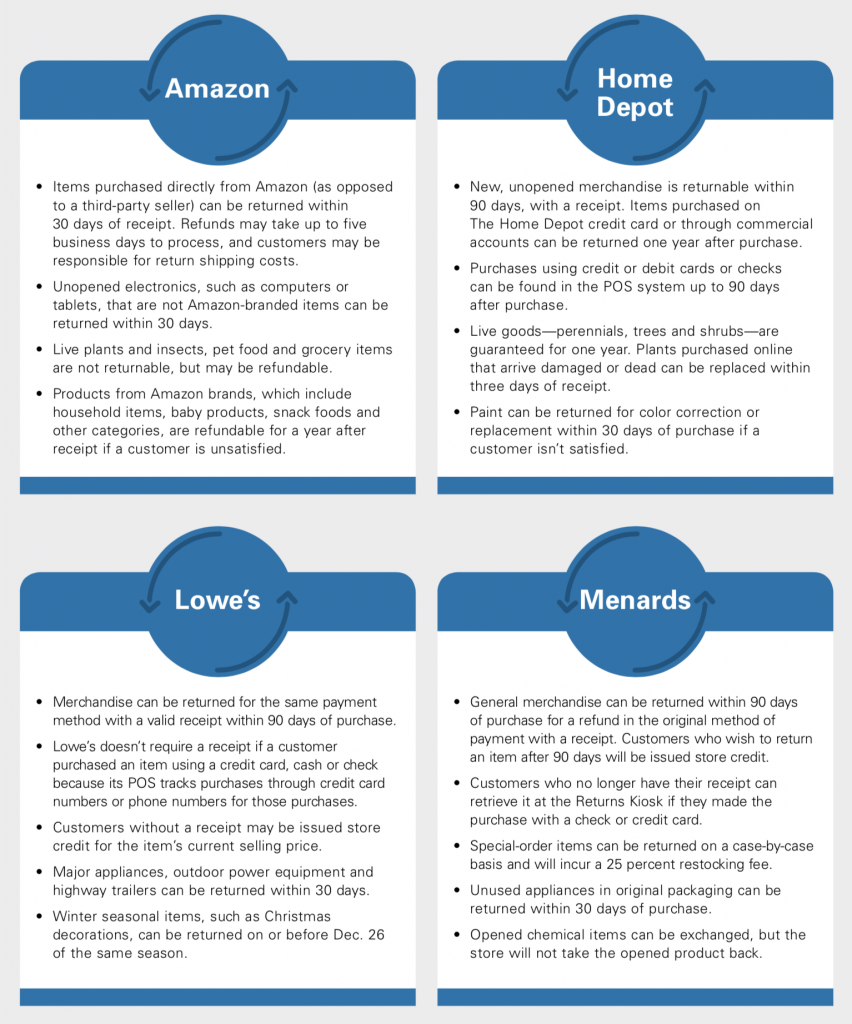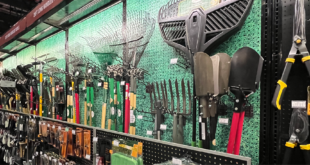Click the picture to download a PDF of this story.
Earlier this year, outdoor apparel retailer L.L. Bean converted its no-questions-asked lifetime return policy to a one-year policy, receipt required. In a letter dated Feb. 9 on the company’s Facebook page, the retailer said it needed to make the change because of customers who were “interpreting [the] guarantee well beyond its original intent.”
Another challenge independent retailers face when it comes to returns is the convenience that competitors like Amazon offer. By simplifying their process, retailers will see less fraud and more dedicated customers.
Hardware Retailing spoke to Zach Coblentz from Hartville Hardware, an independent business in Hartville, Ohio, that recently updated its return policy to make the process smoother for customers and simpler for staff to understand and execute.
Read Coblentz’s advice on the following pages and take some cues from your competition to make sure you are living up to your service-focused reputation. For additional insights on returns from retailers enrolled in the North American Retail Hardware Association’s Retail Management Certification Program, click here.
Create a policy that is easy to understand.
Inside Hartville Hardware is seven acres of retail space, where the company houses 12 departments, from traditional hardware and outdoor living to apparel and farm and pet.
In such a large operation, it’s crucial that all associates have the same information, especially when it comes to the store’s return policy, says Coblentz.
“Store associates need more direction out of a return policy,” he says. “Sometimes, a customer will bring in a return and ask the first person they see if they can return it, and that person just tells them to take it to the customer service desk. Salesfloor associates don’t consider whether the item is actually returnable.”
All store associates are expected to know the policy, even though returns can only be made with customer service associates at the service desk, not with cashiers at registers. The new policy at Hartville has three primary components.
- Unopened merchandise can be returned with a receipt no matter how old it is. Returns made after one year will be credited with a gift card.
- Opened, unused merchandise can be returned within 90 days with a receipt.
- If a customer uses a product and isn’t satisfied with it for any reason, it can be returned within30 days with a receipt.
“When it comes to returns, there are a lot of gray areas,” Coblentz says. “When we encounter one, generally we will side with the customer, but this policy tries to make everything a little clearer.”
Trust your staff to make smart decisions.
Coblentz says the core of the company’s return policy is that they want to be able to return or exchange any product.
“We don’t want a customer to have anything they’re not happy with,” he says.
The new policy helps all customer service associates who process returns understand what decision to make when a customer brings in a product to return it. But there are some situations that require additional oversight.
To help address customers’ needs and respect the return policy, Hartville Hardware department managers have the final authority to decide whether a product can be returned, even if it doesn’t meet the standards of the policy. If an associate has a question about a return, they consult the department manager, who can authorize or reject the return.
“We had a customer come in who wanted to return a pair boots he had been wearing. He had been wearing them for 40 days, which is 10 days past our 30-day used merchandise return policy,” Coblentz says. “But the customer wasn’t happy with them, and we don’t want to make it so cut and dry that we would miss out on a future sale. The department manager chose to accept the return so the customer could find something that worked better for him.”
Rely on technology to help reduce fraud.
When the ambiguities aren’t easily distinguishable for a return, customer service associates and department managers at Hartville Hardware let the registers help.
The company recently upgraded its system with its POS vendor to track credit card purchases back 18 months, instead of just seven months like the prior system. Coblentz says the majority of purchases at the store are made with credit cards, so only a fraction of purchases aren’t tracked.
He says the company does experience return fraud, and having the technology to support their new policy will help them weed out the customers who want to take advantage. The new system also lets associates scan customers’ IDs, which provides an additional layer to confirm someone’s identity. He remembers one customer who attempted to make a return without a receipt. They realized the customer had multiple accounts in the system with different names and addresses. To prevent this type of fraud, the new policy requires all customers to provide a photo ID to make returns.
“Part of the new policy is theft prevention,” he says. “We want to return the item, but we need to verify the purchase.”
Store associates have the ability to search for customer name, SKU or credit card number in the system, which will bring up an image of the receipt if the product a customer wishes to return was purchased legitimately. From there, associates can determine how or whether to proceed.
From picking receipts out of the trash to requesting a different payment method in return, customers get creative to get cash. To help associates identify return fraud in action, the policy outlines various forms so they can be prepared to spot it.
Have a positive attitude and think long term.
Coblentz recognizes that retailers at smaller operations who work the floor and also set the return policy may be more stringent about returns because they see fraud happen more often than he does.
“We have some managers who have seen people abuse the return policy,” he says. “They remember that and think, ‘We can’t let this happen.’ It’s a little easier to make the policy when you are removed from it.”
At the same time, he says it’s important to develop a policy that serves the business, the customers and the employees. He helped develop the Hartville Hardware policy based on the company’s guiding principles, which is something he recommends all retailers consider when developing their own policies.
“We are long-term focused,” he says. “That means it’s not about one single sale. If our attitude is that if we return this $40 item, we’re in the hole, that’s short-sighted. You have to do what fits your business for 95 percent of your returns.”
In addition to considering Hartville Hardware’s guiding statements for the new policy, the management team also considered big-box competitor Home Depot.
“We want to keep customers coming back, which is what this policy is really about,” he says. “We looked at Home Depot because they’re our largest competitor, and they have a reputation for easy returns.”
Taking a Big Cue on Returns
To help independent retailers evaluate their return policies, Hardware Retailing considered the policies of big-box home improvement retailers Home Depot, Lowe’s and Menards and online retailer Amazon to create a checklist of return policy components. See snapshots of these companies’ policies here and compare them to your own to determine how easy—or complex—returns are for your customers.
Download this overview for a quick reference here.
 Hardware Retailing The Industry's Source for Insights and Information
Hardware Retailing The Industry's Source for Insights and Information











